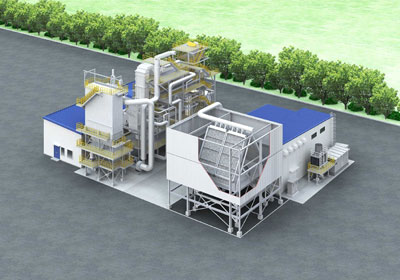
Epson building its first biomass power plant in Japan as part of its decarbonization goals
March 14, 2024
By Canadian Biomass Staff
 Conceptual drawing of the Minami-Shinshu Biomass power plant. Image: Epson
Conceptual drawing of the Minami-Shinshu Biomass power plant. Image: Epson Epson has announced plans to build its first ever biomass plant — choosing Iida City, in Nagano Prefecture, Japan.
The Seiko Epson Corporation said it hopes to have the plant in operation in the 2026 fiscal year (ending March 2027) and is moving to secure the land and buildings, contract construction, and file the paperwork for power generation.
Epson publicly committed to becoming carbon negative and underground resource free in Environmental Vision 2050. The use of renewable electricity is a key means by which Epson seeks to reach its goal of decarbonization and, in December 2023, Epson completed the switch to 100 per cent renewable electricity at all Epson Group sites around the world, it said in a press release.
“The new power plant is intended to provide Epson with self-generated renewable electricity on a continuous basis and reduce the ratio of electricity the company purchases from external power companies, thereby promoting wider public adoption of renewable electricity,” it said.
It plans to construct the plant on the site of the former Kiribayashi Clean Center, which the Minami Shinshu Wide-Area Union shut down in December 2017.
The electricity generated will be sold to the market under a feed-in premium (FIP) scheme, and Epson will convert the electricity that it uses into renewable electricity by leveraging the environmental value created through power generation. Moreover, the power is expected to be supplied to local facilities in the event of a disaster or other emergency.
Tree bark, mushrooms, waste pallets to be used
“The power plant will not depend on fossil fuels,” it said. “It will be fueled primarily by unused wood from the Minami Shinshu area, as well as by materials such as tree bark, mushroom culture medium, and some waste wooden pallets from Epson. By utilizing wood and bark from neglected forests, Epson will also be contributing to forest maintenance.”
Construction of this power plant will increase the ratio of self-generated power and meet the technical criteria of RE100, which emphasizes additionality, it said. In the future, Epson aims to create a closed-loop power plant, including by developing technology for the fixation and utilization of CO2 produced during power generation.
Epson will continue to promote the wide-spread adoption of renewable electricity, reduce its energy consumption, and circulate resources on its way to realizing Environmental Vision 2050.
Energy output
Epson said the plant will produce 1,990 kW with an estimated annual power generated of 14 million kWh.
Print this page